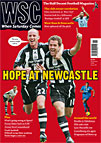 Bruce Wilkinson assesses Blackburn's attempt to gain Asian supporters
Bruce Wilkinson assesses Blackburn's attempt to gain Asian supporters
Blackburn Rovers are based in a town with a large Muslim population who traditionally have not followed the team. Over the last couple of years, the club has worked hard to attract more Asian supporters. The roll call of contributors to the club’s equality document (then Minister for Sport Richard Caborn, chair of Kick It Out Lord Herman Ouseley and former president of the Lancashire Council of Mosques Lord Adam Patel) shows the level of importance afforded to the issue.
Positive developments have included a questionnaire about racial background sent out with season tickets; a hotline for reporting abuse; incorporating UEFA’s ten-point action plan into the club’s objectives; and consultation with the representatives of local ethnic minorities. However, its latest move in this direction, the creation of a prayer room, threatens to derail much of the club’s good work to date.
The first news of the development came from a fan posting on an internet message board. He had been on a ground tour and, noticing the building work, was told that a toilet block was being turned into a prayer room. Many on the website dismissed the story and, without any official confirmation, it slowly disappeared. In mid-August, only a week or so before the start of the season, the news broke in the Lancashire Telegraph that part of the latrines in the lower tier of the Blackburn End had been demolished to create a multi-faith prayer room. An opportunity for positive PR with a carefully managed story was lost and instead ammunition was given to those looking to stoke up racial tension.
A glance at fan sites shows the strength of feeling it has generated and the atmosphere in that part of the ground for the first home game was quite tense, particularly around half-time when a number of spectators were ejected while trying to force their way into the room. It gave those who would like to return to the bad old days of openly racist chanting the opportunity to whip up a bit of anger and unrest. In a part of Lancashire struggling to see off the BNP, these kinds of scenes only have a negative impact.
The club disputes that the move has created any animosity: “Opening a multi-faith room was something of a ground-breaking venture, generating a tremendous amount of media coverage,” claims a Rovers spokesman. “We have received very few negative comments or complaints and these generally referred to the suitability of the location.”
It is difficult to understand why the prayer room was placed in on one of the least appropriate parts of the stadium. The Nutall Street side of the Blackburn End has always been home to the more vociferous elements of support. Placing a room for quiet contemplation directly beneath one of the few noisy parts of the ground and next to the busiest toilets was an odd decision. It can only be presumed that whoever made it is not a regular visitor to that end during games.
The room has now been closed. It will replaced by a facility in the Fraser Eagle Stand, an old part of the ground running the length of the pitch, which generally contains families and older supporters. Despite never previously mentioning that the site might be temporary, a club spokesman now claims: “When we first decided to open the room we had in mind reviewing certain aspects after the early games. We wanted the chance to assess the situation after seeing it operate on a matchday. After taking several issues into consideration, we came to the conclusion that a site at the rear of the Fraser Eagle Stand would prove a better alternative.”
Blackburn Rovers should be commended for their attempts to make Ewood Park a more culturally diverse place to work and watch football, but they have some way to go for their media skills to catch up. Publicised sensitively and placed more thoughtfully within the ground, the prayer room could have been another bridge between two seemingly disparate communities. Instead it has merely stirred up ill-feeling and threatens to set back what progress has already been achieved.
From WSC 261 November 2008